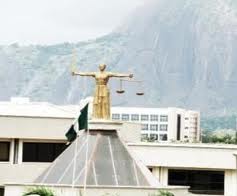Nigerian Government and Judiciary are Corrupt-General Electric
A US based Multinational Corporation with a strong presence in Nigeria and enjoying the patronage of the federal government in the oil and gas sector has accused the Nigerian judiciary of understaffing inefficiency and corruption. In its Motion for Summary Disposition of a petition to recognize a Nigerian money Judgment which was filed against it by Q Oil Services Nigeria Ltd, another Nigerian Company, before a Detroit, Michigan Circuit Court, General Electric International Company has urged the US Court not to recognize the Nigerian judgment because the Judgment, according to the General Electric, “was rendered under a Judicial System that does not provide impartial Tribunals or procedures compatible with the requirements of due process of law”
 In its submission to the Court on why the Nigerian judgment must not be recognized in the US, the General Electric relies on the US State Department’s country’s Report on Nigeria for 2012 which contains the following findings about the Nigerian judicial system: “Although the constitution and law provide for an independent judiciary, the judicial branch remained susceptible to pressure from the executive and legislative branches and the business sector. Political leaders influenced the judiciary, particularly at the state and local levels. Understaffing, underfunding, inefficiency, and corruption continued to prevent the judiciary from functioning adequately. Judges frequently failed to appear for trials, often because they were pursuing other sources of income and sometimes because of threats against them. In addition court officials often lacked the proper equipment, training, and motivation to perform their duties, with lack of motivation primarily due to inadequate compensation. During the year Supreme Court judges called for a more independent judiciary”.
In its submission to the Court on why the Nigerian judgment must not be recognized in the US, the General Electric relies on the US State Department’s country’s Report on Nigeria for 2012 which contains the following findings about the Nigerian judicial system: “Although the constitution and law provide for an independent judiciary, the judicial branch remained susceptible to pressure from the executive and legislative branches and the business sector. Political leaders influenced the judiciary, particularly at the state and local levels. Understaffing, underfunding, inefficiency, and corruption continued to prevent the judiciary from functioning adequately. Judges frequently failed to appear for trials, often because they were pursuing other sources of income and sometimes because of threats against them. In addition court officials often lacked the proper equipment, training, and motivation to perform their duties, with lack of motivation primarily due to inadequate compensation. During the year Supreme Court judges called for a more independent judiciary”.
“On August 18, the National Judicial Council (NJC) suspended the president of the Court of Appeal, Justice Ayo Isa Salami, after he refused the NJC’s directive to apologize to the NJC and the chief justice of Nigeria, Justice Aloysius Katsina-Alu. Salanii had accused Katsina-Alu of interfering in the proceedings of the 2007 Sokoto State gubernatorial court case. In an attempt to settle the dispute, the NJC set up three panels to investigate the disagreement. The panels declared neither justice was at fault, declared the issue resolved, and requested that Salami apologize to the NJC and Katsina-Alu. The Nigerian Bar Association reached contrary findings, and Salami refused to apologize. After the NJC suspended Salami, President Jonathan used his constitutional authority to recommend the compulsory retirement of Salami and appointed Justice Dalhatu Adamu as acting president of the Court of Appeals. The case raised questions regarding the partisan nature and level of independence within the judiciary. Salami appealed the ruling, and the court case continued at year’s end”.
According to General Electric, the US State Department’s findings on Nigeria is consistent with a similar finding on the Liberian Courts for the same year which a US Court of Appeals had relied upon to refuse recognition to a Liberian Judgment in the US. “The court found the Country Reports reliable because the Reports are submitted annually, and are therefore investigated in a timely manner. They are prepared by area specialists at the State Department” and based on the State Department’s findings, the judgment of the Nigerian court is unenforceable in Michigan, GE argued.
In addition, GE also urged the US Court not to recognize the judgment because it was “rendered in circumstances that raise substantial doubt about the integrity of the rendering court with respect to the judgment, or the specific proceeding in the foreign court leading to the judgment was not compatible with due process of law.” Accusing the presiding Justice High Court of Rivers State of possible bias in the proceedings, GE stated that “the Nigerian trial court’s September 29, 2010 default Judgment granted Q Oil’s claim for declaratory relief claims and all of the damages it sought, including $5,000,000 USD in supposed “general” damages, without a shred of evidence, and without a formal trial, contrary to Nigerian law and public policy”.
Finally, GE prays the Court to dismiss the petition for recognition or in the in the event the “Court does not dismiss the complaint, this Court should enter an order staying this proceeding until the conclusion of all appeals in Nigeria”
It could be recalled that the Plaintiff, Q Oil and Gas Services Nigeria Limited has asks the US Court to “recognize” a Nigerian Court Judgment in the sum of $5.5 million entered against Defendant GE International Operations, Nigeria Ltd. Q Oil brings its complaint pursuant to the Michigan Uniform Foreign Country Money Judgments Recognition Act of 2008 (“UFCMJRA”).
Q Oil and Gas Services is expected to file its response to the allegations this week.

